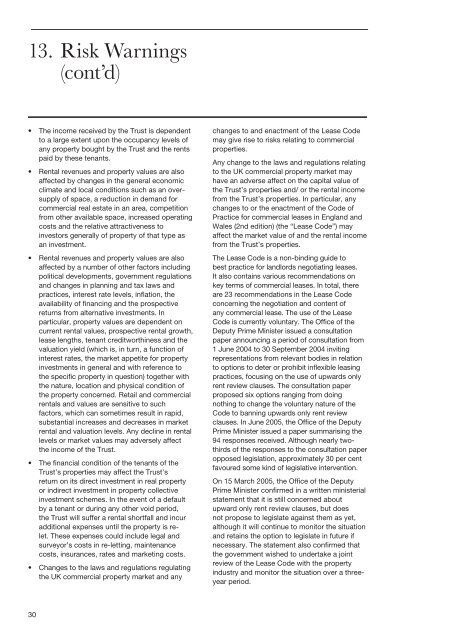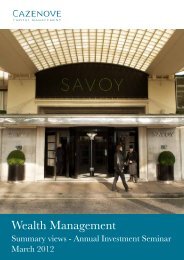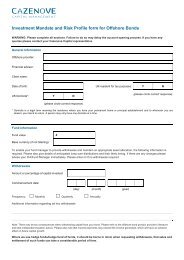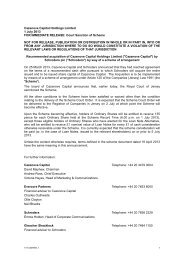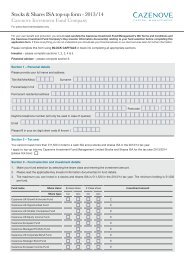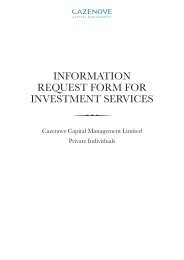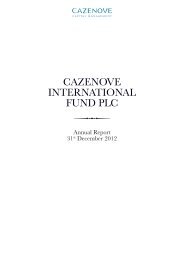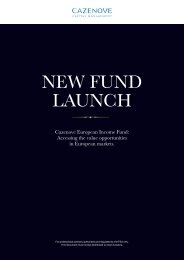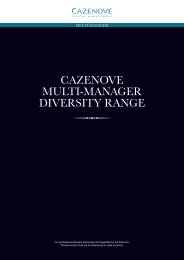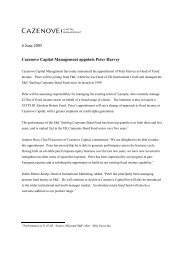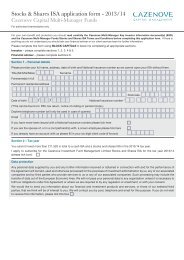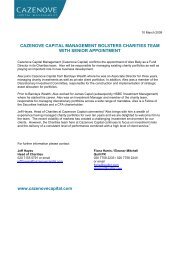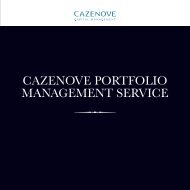SCHEME PARTICULARS
SCHEME PARTICULARS - Cazenove Capital Management
SCHEME PARTICULARS - Cazenove Capital Management
- No tags were found...
Create successful ePaper yourself
Turn your PDF publications into a flip-book with our unique Google optimized e-Paper software.
13. Risk Warnings<br />
(cont’d)<br />
• The income received by the Trust is dependent<br />
to a large extent upon the occupancy levels of<br />
any property bought by the Trust and the rents<br />
paid by these tenants.<br />
• Rental revenues and property values are also<br />
affected by changes in the general economic<br />
climate and local conditions such as an oversupply<br />
of space, a reduction in demand for<br />
commercial real estate in an area, competition<br />
from other available space, increased operating<br />
costs and the relative attractiveness to<br />
investors generally of property of that type as<br />
an investment.<br />
• Rental revenues and property values are also<br />
affected by a number of other factors including<br />
political developments, government regulations<br />
and changes in planning and tax laws and<br />
practices, interest rate levels, inflation, the<br />
availability of financing and the prospective<br />
returns from alternative investments. In<br />
particular, property values are dependent on<br />
current rental values, prospective rental growth,<br />
lease lengths, tenant creditworthiness and the<br />
valuation yield (which is, in turn, a function of<br />
interest rates, the market appetite for property<br />
investments in general and with reference to<br />
the specific property in question) together with<br />
the nature, location and physical condition of<br />
the property concerned. Retail and commercial<br />
rentals and values are sensitive to such<br />
factors, which can sometimes result in rapid,<br />
substantial increases and decreases in market<br />
rental and valuation levels. Any decline in rental<br />
levels or market values may adversely affect<br />
the income of the Trust.<br />
• The financial condition of the tenants of the<br />
Trust’s properties may affect the Trust’s<br />
return on its direct investment in real property<br />
or indirect investment in property collective<br />
investment schemes. In the event of a default<br />
by a tenant or during any other void period,<br />
the Trust will suffer a rental shortfall and incur<br />
additional expenses until the property is relet.<br />
These expenses could include legal and<br />
surveyor’s costs in re-letting, maintenance<br />
costs, insurances, rates and marketing costs.<br />
• Changes to the laws and regulations regulating<br />
the UK commercial property market and any<br />
changes to and enactment of the Lease Code<br />
may give rise to risks relating to commercial<br />
properties.<br />
Any change to the laws and regulations relating<br />
to the UK commercial property market may<br />
have an adverse affect on the capital value of<br />
the Trust’s properties and/ or the rental income<br />
from the Trust’s properties. In particular, any<br />
changes to or the enactment of the Code of<br />
Practice for commercial leases in England and<br />
Wales (2nd edition) (the “Lease Code”) may<br />
affect the market value of and the rental income<br />
from the Trust’s properties.<br />
The Lease Code is a non-binding guide to<br />
best practice for landlords negotiating leases.<br />
It also contains various recommendations on<br />
key terms of commercial leases. In total, there<br />
are 23 recommendations in the Lease Code<br />
concerning the negotiation and content of<br />
any commercial lease. The use of the Lease<br />
Code is currently voluntary. The Office of the<br />
Deputy Prime Minister issued a consultation<br />
paper announcing a period of consultation from<br />
1 June 2004 to 30 September 2004 inviting<br />
representations from relevant bodies in relation<br />
to options to deter or prohibit inflexible leasing<br />
practices, focusing on the use of upwards only<br />
rent review clauses. The consultation paper<br />
proposed six options ranging from doing<br />
nothing to change the voluntary nature of the<br />
Code to banning upwards only rent review<br />
clauses. In June 2005, the Office of the Deputy<br />
Prime Minister issued a paper summarising the<br />
94 responses received. Although nearly twothirds<br />
of the responses to the consultation paper<br />
opposed legislation, approximately 30 per cent<br />
favoured some kind of legislative intervention.<br />
On 15 March 2005, the Office of the Deputy<br />
Prime Minister confirmed in a written ministerial<br />
statement that it is still concerned about<br />
upward only rent review clauses, but does<br />
not propose to legislate against them as yet,<br />
although it will continue to monitor the situation<br />
and retains the option to legislate in future if<br />
necessary. The statement also confirmed that<br />
the government wished to undertake a joint<br />
review of the Lease Code with the property<br />
industry and monitor the situation over a threeyear<br />
period.<br />
30


